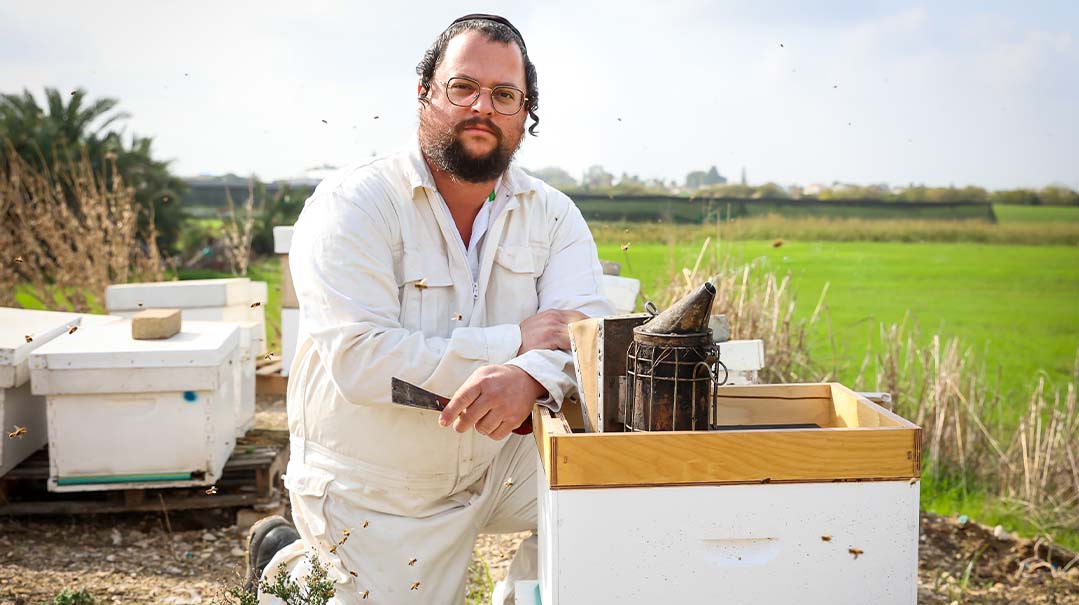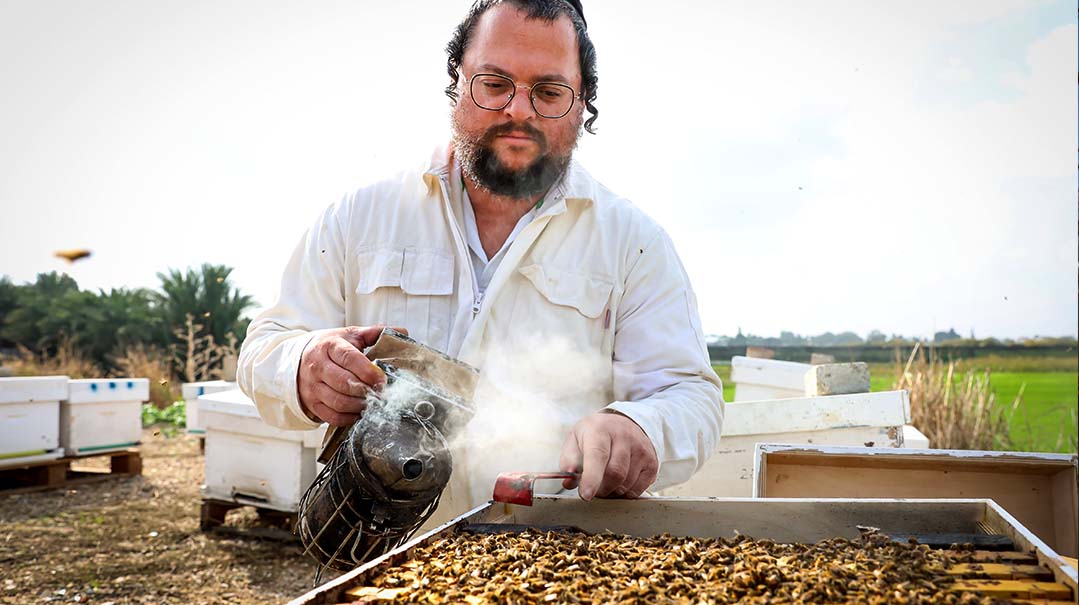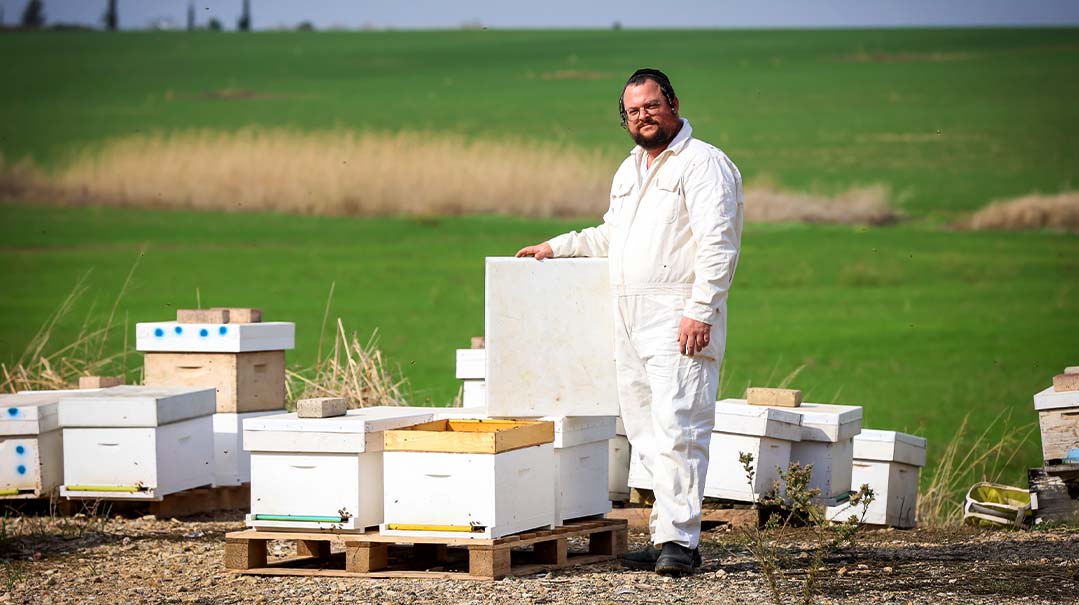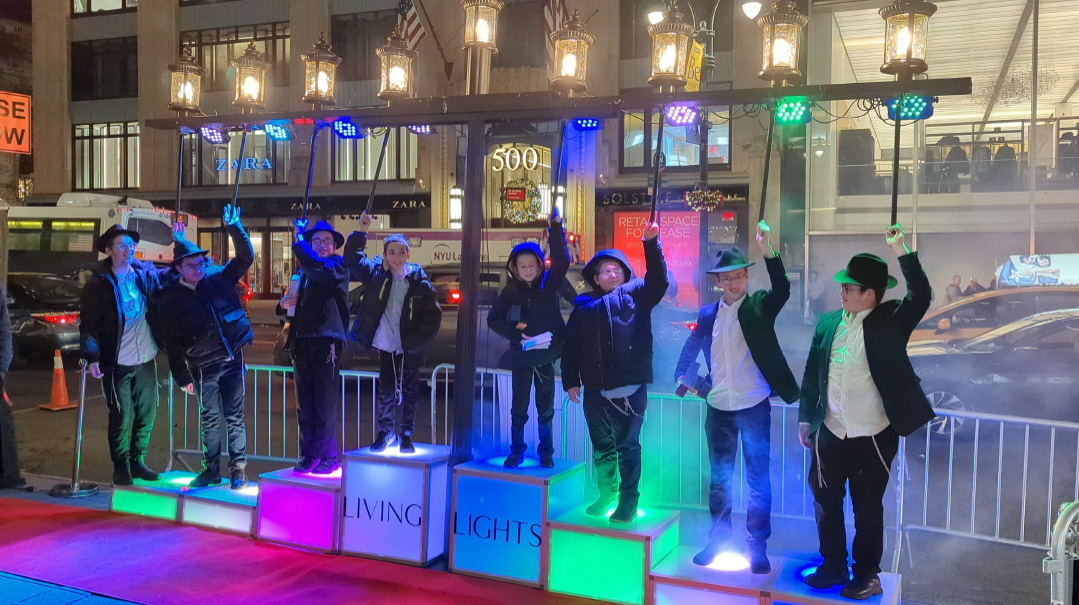The Stings and the Sweetness

The Kohn family has been beekeepers for three generations

Photos: Itzik Blintsky
The Sweetest Labor
When 39-year-old Chaim Kohn of Beit Chilkiyah picked up his phone, he was surprised to hear a representative of AgroMashov on the line. Hosted annually in Tel Aviv, Israel’s international agricultural expo attracts a wide audience of farmers and entrepreneurs who come to network, showcase their produce, and learn about the latest advances in agrotechnology,
“Chaim?” she said.
“Yes,” he answered.
“Congratulations! You’ve made it onto the list of Israel’s 40 most promising young agriculturists,” she continued. Naturally, Chaim was pleasantly surprised, but that was nothing compared to his caller’s shock when she realized the third-generation beekeeper who’d landed this coveted honor was a chassid.
Chaim Kohn is one of Israel’s 529 registered beekeepers harvesting 120,000 hives in the collective effort to produce the 4,500 tons of honey Israelis consume annually. He owns 1,800 hives, dispersed all over the country, from the Besor region in the south to Kfar Saba in the center.
“For as long as I can remember, I’ve connected to the work. I like bees and I like nature,” he says. “You get to see the wonders of creation from up close.”
He doesn’t claim it’s easy. “The work is endless and draining,” he says. “You go out to work in the morning and return in the evening. Everything is very physical…. The work is under the open skies. Sometimes my car gets stuck in the surrouning swampy land. Other times, I almost suffocate in the steaming heat. But you can’t decide to stay home because of bad weather.”
It might sound like he’s complaining, but Chaim insists he’s never contemplated switching professions. “I love my work,” he says.
Family Business
The Kohn family has been beekeepers for three generations. “It all began with my grandfather, Reb Mordechai Kohn,” Chaim says. “He came from Romania after the Holocaust. For two years, he lived in Moshav Beit Meir, until Beit Chilkiyah was established by the Poalei Agudas Yisrael movement.”
His friend, Shmuel Daskal, contacted him and told him that he had beehives, and Reb Mordechai suggested that they partner; he would provide the land, and Shmuel would provide the hives and the experience. The two friends started their apiary, and the initial 30 hives quickly grew to 60.
Reb Mordechai’s twin sons, Chaim and Menachem, grew up, and joined the family business. Chaim is Menachem’s son and when he was born, a third generation of beekeepers began.
“I remember putting stickers on jars of honey as a little boy. When I grew a little older, my father allowed me to fill the jars and do packaging work. When I was about 11, I went out into the fields.”
As a bochur, Chaim learned in Yeshivas Nezer HaTorah in Jerusalem. “Even when I learned in yeshivah, I would come home each Friday and help out for Shabbos. Then I went to help my father in the apiary.
“Once, Rav Shmuel Wosner ztz”l, who spent time each year in Beit Chilkiyah during bein hazmanim, came for a visit to our apiary. When he entered our storage room and saw us working with the honey, his reaction was: ‘A koshere parnassah — a kosher livelihood.’ ”

Live Like a Queen
Chaim Kohn gives us a small glimpse of what it takes to maintain an apiary.
“A bee is a living creature. It needs food, and most importantly, good health. As a beekeeper, I firstly need to ensure the health of the bees. Only when a bee is healthy can it produce honey. I come to the hive each day, check that it’s in order, and make sure that there are no viruses spreading. During the incubation period, we need to transfer hives and take care of the bees, all while wearing protective coveralls, which makes it much harder to do the work.
“Here, this is the queen,” he explains, pointing to one of the active bees. “She’s the one who actually produces the honey. You know, every hive has only one queen, and if there are two, then one kills the other…. A bee lives all of three months to half a year, and look how much they accomplish in this time.”
Bee stings are par for the course, he says, but he’s so used to them that they don’t really affect him much. But a bee sting nearly cost his brother his life. “My brother worked with us for a long time, until one day, he was stung and began to feel sick. He seemed to be losing consciousness. By the time we got to the emergency room he was experiencing severe shortness of breath.” It seems he developed an allergy to bee stings as an adult, without previous signs. That was the end of his working with the hives.
The Bees and Me
There aren’t many chareidi beekeepers in Israel, and he says it isn’t so easy to be a Torah-observant beekeeper. “The busiest times of year are Chol Hamoed Succos and Chol Hamoed Pesach,” Chaim explains. “Moreover, work in the hives is extremely structured. For example, you need to take into account that introducing a new queen bee can’t happen on Shabbos, and preferably not on Friday either. There’s also the subject of starting work in the morning. Because the weather is usually very hot, workers prefer to begin before sunrise, while I only start after Shacharis.”
Then there are the thefts. Beekeepers put tracking devices on their hives, to cope with the phenomenon of Arabs in the PA-controlled areas stealing the hives and making their way back across the Green Line. Chaim recalls one instance where the locator rang on Shabbos, but he couldn’t do anything about it.
Still, he highlights an advantage of his work, which some might consider lonely. “I don’t meet too many people or problematic scenes on the street. For most of the day, it’s just the Ribono shel Olam and me.”
Double Punch
Six years ago, tragedy hit the Kohn family. when Reb Menachem Kohn z”l, Chaim’s father, passed away. “My father suffered from heart problems for years, but we never thought, at that stage, that he was going to leave the world,” he says. “Especially since he worked energetically until his final day. He was with us all the time.
“My father was only 63 when he passed away, and the pain was overwhelming. For me it wasn’t only parting from a beloved father, he was also my partner, my friend, and the person with whom I spent most of my waking hours. We even lived next door to one another. It seemed impossible to continue living without him.”
Aside from his huge personal loss, Chaim feels the impact of his father’s death every day while working in the apiary. “Since my father passed away, work is very different. My father, in contrast to me, was the picture of tranquility,” Chaim relates. “When he approached the bees, he came quietly and calmly, and his inner peace radiated outward. Usually, this calm prevented him from getting stung, and made it possible for him to do his work effectively. Because if you’re nervous when you approach the bees, they react by acting nervous as well. When you come calmly, they’re also calm. There’s no one who can replace my father in this.”
After the shloshim, Chaim and his uncle Chaim, the two remaining partners, resolved to keep going. Despite their shared grief, they had a business to run. And they made it through that first year, though they often found themselves wondering what Reb Menachem would have done. But a year later, tragedy hit again.
One Friday morning, while Uncle Chaim was driving the tractor to the apiary, a truck ran over the tractor, and Reb Chaim was killed instantly.
It’s difficult for Chaim to share the memories. “It was a tragedy that shattered all of us. Nothing can prepare you for the loss of a person who you spoke to two minutes earlier….
“My uncle was such a special person, and full of simchas hachayim. There was always an optimistic and upbeat atmosphere around him. Every time there was a crisis in the business, or a problem arose, he was encouraging and supportive. We simply couldn’t digest the fact that all these good things had been taken from us in a minute. The only thing that gave me and his family strength was the thought that he had passed away on Erev Shabbos… when tzaddikim depart This World.”

Stuck in the Shadows
Once again Chaim was left struggling not only to recover emotionally; professionally he was also at a loss. “Suddenly I realized that I was alone in the business. My father and uncle were the people closest to me — they were my whole life. I knew that the secret of the success that had accompanied us over the years was our three-way bond. It was a winning combination. I had spent my whole life in their company, and suddenly I was alone? I had no idea how I was going to get through it.”
At first he felt he simply couldn’t go on. “For almost a week, I didn’t go to the apiary,” Chaim says. “I couldn’t even go into the storage area. I wasn’t able to look at anything that would remind me of what had been and was now gone.”
But then, digging deep into reserves of emunah and fortitude, he realized that continuing to run the business, his huge losses notwithstanding, is what his father and uncle would have wanted him to do.
“About a week after the shivah, I had no choice, and entered the storage area for the first time since the accident. I felt like I was walking into an empty void. But there, when I sat down amid the packaging and jars of honey, I began to realize that this was my life’s test. This wasn’t only a family business, it was also a mission that my father and uncle had always felt part of. Even at times when the business struggled, and it wasn’t really worth it to maintain it, they knew that this was their role — to provide high-quality honey, a job that not everyone can do. In fact, there are only a few hundred expert beekeepers in the country. It was clear to me that they wanted me to continue their path and their family vision. I left the storage area with a feeling that even if it would be very hard, I was going to continue this path.”
The first year was the hardest. “I had good friends in the industry who helped me out. They gave me a lot of support. For the first year, I was just trying to survive and to keep my head above water. It wasn’t an easy year — the thoughts came nonstop, inundating me, accompanying me all the time.
Busy as a Bee
After that first tumultuous year, not only was Chaim still running the business, but he felt confident enough to expand. “After that year passed, I realized that times had changed. If once, when my father and his brother were in the business, we could earn a good living from 400 hives, today, if you don’t grow, you don’t make it. The amount we’d earned in the past were no longer enough to support us.”
He decided to make the bold move of purchasing more hives.
Today, Kohn owns 1,800 beehives in seven regions around the country. Beekeeping, he says, has become harder in recent years because of climate changes and fires that have burned up many hives and the bees’ pastureland. Still, he’s planning to expand. “I hope to get another 1,800 hives,” he says.
He’s lost his father and his uncle, two close relatives and his business partners, but still, he’s looking ahead to a sweeter future.
(Originally featured in Mishpacha, Issue 896)
Oops! We could not locate your form.






